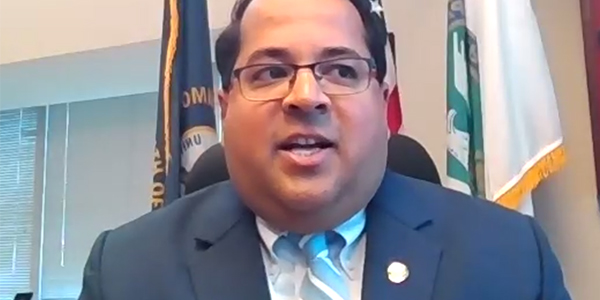Like many Americans, FERC Chairman Neil Chatterjee has seen his life upended by the COVID-19 coronavirus.
While the commission and its staff have been “going about our business” — conducting its April open meeting and all other meetings virtually — Chatterjee has assumed additional responsibilities at home. With his three children now sequestered at the family’s Virginia home, he has taken on the role of middle school and elementary school teacher. This weekend, he added barber to his duties.
“Seventh-grade math is probably more challenging than the oversight of wholesale markets,” Chatterjee said during a virtual fireside chat conducted by the nonpartisan Atlantic Council think tank.
Chatterjee appeared to be speaking from the FERC offices. That is, unless he collects and stores governmental flags at his home.
“We really are making a conscious effort to keep the commission running as normal as possible,” he said. “Seven weeks in, we have transitioned all our employees, here in D.C. and across the country, to full telework.”
Chatterjee said the commission has faced the pandemic’s regional stay-at-home orders with a three-phased approach.
First, he said, FERC made clear to its stakeholders that, given the lack of face-to-face meetings, it recognized that not all compliance obligations could be met. “We tried to provide transparency and clarity and let them focus on their No. 1 priority: keeping the lights on,” Chatterjee said.
The second phase is keeping the commission running and letting stakeholders know FERC is still open for business. Check.
The third phase, and probably most important, is preparing the electric grid and industry for what happens “when we come out of this,” he said.
Chatterjee cited the load shift from industrial and commercial demand to residential demand, the moratorium on customer cutoffs and the suspension of infrastructure work as examples of changes in the industry.
He also noted an increase in the dispatch of gas-fired plants as natural gas prices plummeted along with that of oil.
“Gas being dispatched at a higher rate is putting [financial] pressure on renewables, nuclear and coal. We could see shutoffs and shutdowns occur as a result of economic pressure, then see a surge in demand when we re-open,” he said. “I want to start talking about these things now … and getting people at the commission, federal and state levels to start thinking through some of the challenges we’ll face when we reopen.”
Noting social distancing and stay-at-home orders have reduced demand as much as 9% in some regions and affected intraday load shapes, Chatterjee warned of their impacts over the long term.
“You could have RTOs and ISOs and utilities cancel projects. Developers might cancel projects because of lower loads,” he said. “These are really thorny issues. This goes back to the balance we have to continually strike between consumer concerns and utility concerns. It’s a reason why we not only need to be focused on how to get out of this pandemic, but we have to be ready when we come out.”
Until then, Chatterjee’s concerns will rest with the electric industry and its workers. He said utility workers have been “real heroes” during the pandemic, along with other front-line workers and first responders.
“Most people are working from home. Power plant operators have moved from home to work,” he said, alluding to those who have set up camp at their plants to protect their health. “It’s really, really patriotic and heroic. When this is all over, I hope utility workers get their due for the sacrifices they have made.”






